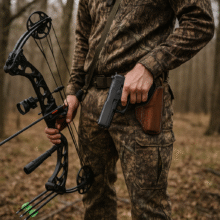The Comprehensive Guide to Buying and Selling Firearms

Table of Contents
Table of contents
Understanding Legal Requirements and Best Practices
Buying and selling firearms involves a complex process with numerous legal requirements and best practices to ensure safety and compliance. In this comprehensive guide, we will cover essential information and steps to help you successfully navigate the process of buying and selling firearms, as well as tips for responsible ownership.
How to Buy a Firearm
Research and Choose the Right Firearm
Before purchasing a firearm, it’s crucial to research and choose the appropriate type and model for your specific needs and preferences. Factors to consider include the intended purpose of the firearm (hunting, self-defense, or sport shooting), your experience level, and your budget. Spend time reading reviews, talking to experienced shooters, and trying out different firearms at a range, if possible.
Locate a Reputable Seller
When purchasing a firearm, it’s essential to find a reputable seller, such as a licensed firearms dealer, online retailer, or local gun store. Always verify the seller’s credentials and reputation before making a purchase. You can also ask for recommendations from friends, family, or shooting clubs to ensure you’re dealing with a trustworthy seller.
Background Checks and Waiting Periods
In most cases, buying a firearm requires a background check to ensure the buyer is legally allowed to own a firearm. The process varies by state, with some requiring waiting periods before the firearm can be transferred to the buyer. Be prepared to provide personal information and wait for the required background check and waiting period to be completed.
Completing the Transaction
To complete the purchase, you’ll need to fill out the required paperwork, such as the ATF Form 4473, and pay any associated fees. The seller will then transfer the firearm to you in accordance with state and federal laws. Make sure to keep all paperwork and receipts related to your purchase for future reference and legal compliance.
How to Sell a Firearm
Determine the Value of Your Firearm
Before selling your firearm, research its current market value based on factors such as its make, model, condition, and rarity. This information will help you set a fair asking price and ensure a smooth transaction. You can consult online resources, firearm price guides, or local gun store experts to help determine the value of your firearm.
Advertise Your Firearm
Create a detailed listing with high-quality photos and an accurate description of your firearm to advertise it for sale. Be honest about the condition and any modifications made to the firearm. You can post your listing on various platforms, such as online firearms marketplaces, local classifieds, or social media groups. Make sure to follow the rules and regulations of each platform when advertising your firearm for sale.
Vet Potential Buyers
When selling a firearm, it’s essential to ensure the buyer is legally allowed to own a firearm. You can do this by requesting a copy of the buyer’s driver’s license and conducting a background check, if required by your state. It’s also a good idea to communicate with potential buyers to get a sense of their intentions and experience with firearms. Trust your instincts and be cautious when dealing with potential buyers.
Complete the Sale
When you’ve agreed on a price and vetted the buyer, you’ll need to complete the sale by transferring ownership of the firearm. This process varies depending on state laws and may require you to involve a licensed firearms dealer to facilitate the transfer. Ensure that all paperwork, such as a bill of sale, is completed and retained by both parties for legal compliance.
Responsible Firearm Ownership and Storage
Responsible firearm ownership includes safely storing firearms to prevent accidents and unauthorized access. Use a secure firearm safe or locking device that is appropriate for the type of firearm being stored. Ensure that firearms are stored unloaded, with ammunition stored separately. Follow manufacturer guidelines for safe storage practices.
Utilizing Firearms Safes and Locking Devices
Invest in a high-quality firearm safe or locking device to secure your firearms when not in use. Safes provide protection against theft, unauthorized access, and damage from fire or other disasters. Choose a safe that meets your needs in terms of size, security features, and accessibility.
Educating Family Members and Practicing Firearm Safety at Home
Educate family members, especially children, about firearm safety. Teach them the basics of firearm safety, including the importance of never touching a firearm without adult supervision. Encourage open communication and establish clear rules and guidelines regarding firearms in the home. Regularly reinforce safe practices and lead by example in practicing responsible firearm ownership.
Firearms and Mental Health
Recognizing the Importance of Mental Health in Firearm Ownership
Mental health holds a crucial position in responsible firearm ownership. Consequently, it becomes imperative to acknowledge the potential influence of mental well-being on the safe utilization of firearms. Engage in regular evaluations of your mental state and, if necessary, actively seek professional assistance and support. Remain cognizant of the correlation between mental health and firearm safety to ensure a responsible approach towards firearm ownership.
Seeking Professional Help and Support for Mental Health Concerns
When facing mental health concerns, it is of utmost importance to seek professional help and support. By reaching out to mental health professionals, you can receive the necessary guidance and assistance. It is crucial to understand that seeking help is not a sign of weakness, but rather a demonstration of strength and responsible firearm ownership.
To ensure the safety of yourself and others, it is crucial to familiarize yourself with local laws concerning mental health and firearm ownership. In certain jurisdictions, specific regulations exist that may impose restrictions on owning firearms for individuals with certain mental health conditions. Therefore, it is important to stay informed and comply with these regulations to promote responsible firearm ownership and enhance overall safety. Therefore, it is essential to comply with these laws and regulations to uphold safety standards and promote responsible firearm ownership.
Best Practices for Responsible Firearm Transactions
Educating Yourself on Firearm Safety and Local Laws
To prioritize firearm safety and comply with local laws, it is crucial to stay informed and continually update your knowledge. By transitioning into a state of continual education, you can make well-informed decisions and ensure responsible firearm transactions. To achieve this, attend firearm safety courses to gain valuable insights, regularly read reputable sources to stay up-to-date, and seek guidance from experts in the field. Transitioning from a passive approach to an active pursuit of knowledge promotes a culture of safety and responsibility. By embracing responsibility as a firearm owner, you contribute to the safety and well-being of all. Additionally, education and adherence to safety practices are pivotal in creating a safer environment for everyone involved.
Maintaining Accurate Records and Documentation
Keep accurate records of all firearm transactions, including purchases and sales. Document relevant information, such as identification details, firearm details, and dates of the transactions. Maintaining accurate records helps ensure compliance with the law, promotes accountability, and provides a clear record of ownership.
Communicating Openly and Honestly in Firearm Transactions
Open and honest communication plays a vital role in firearm transactions. To ensure a smooth and trustworthy exchange, it is crucial to clearly communicate your expectations and provide any relevant information about the firearm. Additionally, make sure to convey any potential restrictions or limitations associated with the firearm.
When engaging in firearm transactions, honesty is paramount. Being forthright about the condition and history of the firearm, including any modifications or repairs made, is important. By maintaining transparency, you foster an environment of trust and promote responsible firearm ownership.
Effective communication is essential to prevent misunderstandings and ensure that both parties are well-informed. Clearly articulate your requirements, such as legal compliance, transfer procedures, or shipping arrangements, to avoid any confusion or complications.
Additionally, openly communicate any specific terms or conditions you expect the buyer or seller to follow, such as age verification, background checks, or permits. This builds trust and alignment between both parties. Open and honest communication fosters a responsible and safe firearm community, promoting transparency and strengthening the overall safety of firearm transactions.
Encouraging Safe and Ethical Firearm Practices
As a responsible firearm owner, it is important to encourage safe and ethical practices among fellow owners and prospective buyers. By sharing knowledge, promoting responsible firearm handling and storage, and advocating for responsible firearm use, we can foster a culture of safety and responsibility. Together, we can contribute to a safer and more responsible firearms community.
Frequently Asked Questions (FAQs)
Q1: Do I need a background check to buy a firearm?
A1: In many jurisdictions, individuals purchasing firearms from licensed dealers are required to undergo a background check. This helps prevent the sale of firearms to prohibited individuals. Background check requirements may vary, so familiarize yourself with local laws to ensure compliance.
Q2: Can I sell a firearm without going through a licensed dealer?
A2: Regulations regarding private firearm sales vary between jurisdictions. Some jurisdictions require private sales to go through licensed dealers, while others allow direct sales between private individuals. It is crucial to understand and comply with the specific laws in your jurisdiction to ensure a legal and responsible sale.
Q3: What should I do if I suspect someone is prohibited from owning firearms?
A3: If you have reason to believe that someone is prohibited from owning firearms, it is crucial to report your concerns to local law enforcement. By doing so, they can investigate the situation and take appropriate action if necessary. This proactive approach promotes public safety and prevents firearms from reaching prohibited individuals, thereby fulfilling our shared responsibility.
Conclusion: Promoting Responsible Firearm Transactions
Responsible firearm transactions are vital for public safety and community well-being. By understanding and complying with legal requirements, promoting responsible firearm ownership, and prioritizing safety, we can foster a culture of responsible firearm use. Continually educating ourselves, following best practices, and cultivating a sense of responsibility in all transactions are key. Together, we can ensure firearms remain in the hands of responsible individuals, promoting a safe and responsible firearms community.







